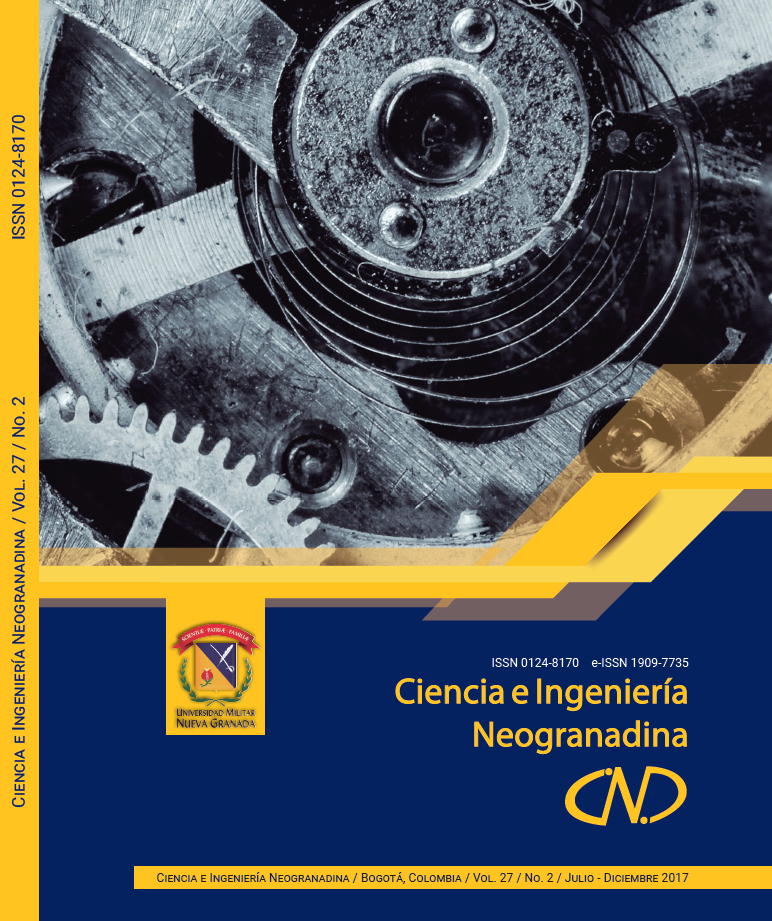Análisis de variables e indicadores para medir el e-gobierno publicados en la literatura científica
Resumen
El desarrollo del e-gobierno ha sido promovido como estrategia para mejorar la eficiencia y eficacia de la gestión pública, facilitar la realización de trámites ante las entidades del Estado, ahorrar tiempo y dinero, aumentar la transparencia, acercar al Gobierno a los diferentes actores, así como buscar una mayor participación en la toma de las decisiones. Dada la importancia que el e-gobierno tiene para varios países, incluida Colombia, es importante analizar qué aspectos son considerados, por la comunidad académica y científica, para su medición y seguimiento. En ese sentido, el propósito de este artículo es presentar el resultado del análisis de variables e indicadores propuestos en la literatura científica en el periodo de 2004 a 2014 para medir el gobierno electrónico. Además, se realizó un análisis cientométrico para la literatura publicada en 2015 y 2016. Para identificar los documentos por analizar se realizó una revisión sistemática de literatura. Posteriormente, las variables y los indicadores fueron clasificados y analizados. Los resultados obtenidos evidencian el interés en medir aspectos relacionados con los servicios ofertados en el e-gobierno y el uso de estándares para el desarrollo de los portales, así como en medir aspectos relacionados con la caracterización de usuarios. Los resultados obtenidos pueden constituirse en un punto de partida para la construcción de sistemas de medición del e-gobierno.
Descargas
Agencias de apoyo:
Universidad del MagdalenaReferencias bibliográficas
J. M. Sánchez-Torres, M. P. González-Zabala y M. P. S. Muñoz, “La Sociedad de la Información: Génesis, Iniciativas, Concepto y su Relación con Las TIC,” Revista UIS Ingenierías, vol. 11, no. 1, pp.113-128, 2013.
R. Ruiz de Querol y J. Buira. La sociedad de la información. Barcelona, España: Editorial UOC, 2007.
P. Valenti, “La Sociedad de la Información en América Latina y el Caribe: TICs y un Nuevo Marco Institucional,” Revista Iberoamericana de Ciencia, Tecnología, Sociedad e Innovación, vol. 2, 2002. [En línea]. Disponible en: http://www.oei.es/historico/revistactsi/numero2/valenti.htm
D. E. Pacheco y M. P. González-Zabala, “Análisis de definiciones de e-gobierno y sus aspectos asociados,” Tesis de pregrado, Facultad de Ingeniería, Ingeniería de Sistemas, Universidad del Magdalena. Santa Marta, Colombia, 2015.
D. E. Pacheco, “Revisión sistemática de la literatura científica sobre los procesos de medición de e-gobierno,” Tesis de pregrado, Facultad de Ingeniería, Universidad del Magdalena. Santa Marta, Colombia, 2015.
J. M. Sánchez-Torres, “Propuesta metodológica para evaluar políticas públicas de promoción del e-government como campo de aplicación de la sociedad de la información. El caso colombiano,” Tesis de doctorado, Doctorado en Economía y Gestión de la Innovación y Política Tecnológica, Universidad Autónoma de Madrid, Madrid, España, 2006.
Colombia, Ministerio de Tecnologías de la Información y las Comunicaciones, “Guía para la caracterización de usuarios de las entidades públicas,” 2011. [En línea]. Disponible en: http://estrategia.gobiernoenlinea.gov.co/623/articles-8536_recurso_1.pdf.
M. P. González-Zabala y J. M. Sánchez-Torres, “Análisis de variables e indicadores empleados para medir la sociedad de la información,” Revista Ingeniaré, vol. 20, no. 3, pp. 433-446, 2012. https://doi.org/10.4067/s0718-33052012000300017
E. Galvis-Lista y J. Sánchez-Torres, “Revisión sistemática de literatura sobre procesos de gestión de conocimiento,” Revista Gerencia Tecnológica Informática, vol. 13, no. 37, pp. 45-67, 2014.
J. C. Steyaert, “Measuring the performance of electronic government services,” Information and Management, vol. 41, no. 3, pp. 369-375., 2014 https://doi.org/10.1016/S0378-7206(03)00025-9
D. Janssen, S. Rotthier y K. Snijkers, “If you measure it they will score: An assessment of international eGovernment benchmarking,” Information Polity, vol. 9, no. 3-4, pp. 121-130, 2004.
S. Kim y H. Lee, “Organizational factors affecting knowledge sharing capabilities in E-government: An empirical study,” en IFIP Int. Working Conf. on Knowledge Management in Electronic Government, pp. 281-293, 2004. https://doi.org/10.1007/978-3-540-24683-1_28
R. M. Peters, M. Janssen y T. M. Van Engers, “Measuring e-government impact: Existing practices and shortcomings,” en 6a Int. Conf. on Elec. Commerce, Copenhagen, Dinamarca, 2004, pp. 480-489. https://doi.org/10.1145/1052220.1052281
J. Kaaya, “The emergence of e-government services in East Africa: Tracking adoption patterns and associated factors,” en 6a Int. Conf. on Elec. Commerce, Copenhagen, Dinamarca, 2004. pp. 438-445. https://doi.org/10.1145/1052220.1052276
P. Shackleton, J. Fisher y L. Dawson, “Evolution of local government e-services: The applicability of e-business maturity models,” en 37th Annu. Hawaii Int. Conf. on System Sciences, Hawaii, Estados Unidos, 2004, pp. 1913-1922. http://dx.doi.org/10.1109/hicss.2004.1265308
H. J. Kim y S. Bretschneider, “Local government information technology capacity: An exploratory theory,” en 37th Annu. Hawaii Int. Conf. on System Sciences, Hawaii, Estados unidos, 2004 pp. 1933-1942. http://dx.doi.org/10.1109/hicss.2004.1265310
J.-R. Fu, W.-P. Chao y C.-K. Farn, “Determinants of taxpayers’ adoption of electronic filing methods in Taiwan: An exploratory study,” Journal of Government Information, vol. 30, no. 5-6, pp. 658-683, 2004. https://doi.org/10.1016/j.jgi.2004.11.002
L. A. Joia, “Developing Government-to-Government enterprises in Brazil: A heuristic model drawn from multiple case studies,” International Journal of Information Management, vol. 24, no. 2, pp. 147-166, 2004. https://doi.org/10.1016/j.ijinfomgt.2003.12.013
H. Abdelghaffar, W.-E. Bakry y P. Duquenoy, “E-government: A new vision for success,” en European and Mediterranean Conf. on Inf. Systems, Cairo, Egypt, 2005, pp. 1-8.
P. Rossel y M. Finger, “Towards a multi-measurement platform of e-Government projects and services,” en European Conf. on e-Government – ECEG, 2005, Antwerp, Belgium, pp. 349-358.
Z. J. Kovačić, “The impact of national culture on worldwide eGovernment readiness,” Informing Science, vol. 8, pp. 143-158, 2005.
D. Kettani, B. Moulin y A. Elmahdi, “Towards a formal framework of impact assessment of e-Government systems on governance,” WSEAS Transactions on Computers, vol. 4, no. 12, pp. 1858-1866, 2005.
C. Caba Pérez, A. M. López Hernández y M. P. Rodríguez Bolívar, “Citizens’ access to on-line governmental financial information: Practices in the European Union countries,” Government Information Quarterly, vol. 22, no. 2, pp. 258-276, 2005. https://doi.org/10.1016/j.giq.2005.02.002
C. Seel, O. Thomas, B. Kaffai y T. Matheis, “Evaluating e-government: A process-oriented approach,” en IFIP Conf. 2005, Poznan, Polonia, 2005, pp. 111-124. https://doi.org/10.1007/0-387-29773-1_8
M. Qi y B. Wei, “Design and analysis of administrative approval act based electronic government evaluation system,” en 7th Int. Conf. on Elec. Commerce - ICEC ‘05, Xi’an, China, 2005, pp. 553-557. http://dx.doi.org/10.1145/1089551.1089651
B. Li, “On the barriers to the development of e-government in China,” en 7th Int. Conf. on Elec. Commerce - ICEC ‘05, Xi’an, China, 2005, pp. 549-552. http://dx.doi.org/10.1145/1089551.1089650
T. Zwahr, M. Finger y P. Mueller, “More than digitisation - The transformative potential of e-governance: An exploratory case study,” en 38th Annu. Hawaii Int. Conf. on System Sciences, Hawaii, Estados Unidos, 2005, pp. 127. http://dx.doi.org/10.1109/hicss.2005.443
M. Janssen y A. Cresswell, “Enterprise architecture integration in E-government,” en 38th Annu. Hawaii Int. Conf. on System Sciences, Hawaii, Estados
Unidos, 2005, pp. 118. https://doi.org/10.1109/HICSS.2005.243
L. Torres, V. Pina y S. Royo, “E-government and the transformation of public administrations in EU countries: Beyond NPM or just a second wave of reforms?,” Online Information Review, vol. 29, no. 5, pp. 531-553, 2005. https://doi.org/10.1108/14684520510628918
L. Torres, V. Pina y B. Acerete, “E-govern-
ment developments on delivering public services among EU cities,” Government Information Quarterly, vol. 22, no. 2, pp. 217-238, 2005. https://doi.org/10.1016/j.giq.2005.02.004
M. Paris, “Local e-government and devolution: Electronic service delivery in Northern Ireland,” Local Government Studies, vol. 31, no. 3, pp. 307-319, 2005. https://doi.org/10.1080/03003930500095137
L. L. Tung, y O. Rieck, “Adoption of electronic government services among business organizations in Singapore,” Journal of Strategic Information Systems, vol. 14, no. 4, pp. 417-440, 2005. https://doi.org/10.1016/j.jsis.2005.06.001
P. S. Herrnson, B. B. Bederson, B. Lee, P. L. Francia et al., “Early appraisals of electronic voting,” Social Science Computer Review, vol. 23, no. 3, pp. 274-292, 2005. https://doi.org/10.1177/0894439305275850
J. C. Thomas y G. Streib, “E-democracy, e-commerce, and e-research: Examining the electronic ties between citizens and governments,” Administration and Society, vol. 37, no. 3, pp. 259-280, 2005. https://doi.org/10.1177/0095399704273212.
T. Carratta, L. Dadayan y E. Ferro, “ROI analysis in e-Government assessment trials: The case of sistema piemonte,” Lecture Notes in Computer Science, pp. 329-340, 2006. https://doi.org/10.1007/11823100_29
V. Petricek, T. Escher, I. J. Cox y H. Margetts, “The web structure of e-government - Developing a methodology for quantitative evaluation,” en 15th Int. Conf. on World Wide Web, New York, Estados Unidos, 2006, pp. 669-678. https://doi.org/10.1145/1135777.1135875
N. Mohamed, H. Hussin y R. Hussein, “Enabling change factors and IT success in the Malaysian e-government implementation,” en PACIS 2006 - 10th Pacific Asia Conf. on Inf. Systems: ICT and Innovation Economy, Taiwan, China, 2006, pp. 1107-1125.
P. T. Jaeger, “Assessing Section 508 compliance on federal e-government Web sites: A multi-method, user-centered evaluation of accessibility for persons with disabilities,” Government Information Quarterly, vol. 23, no. 2, pp. 169-190, 2006. https://doi.org/10.1016/j.giq.2006.03.002
N. Braun y D. Brändli, “Swiss e-voting pilot projects: Evaluation, situation analysis and how to proceed,” en Elec. Voting 2006 - 2nd Int. Workshop, Castle Hofen, Bregenz, Austria, 2006, pp. 27-36.
P. V. Vora, R. Simha y J. Stanton, “A performance ratings framework for the evaluation of electronic voting systems,” en The 2006 Nat. Conf. on Digital Government Research - dg.o ‘06, San Diego, California, 2006, pp. 460-461. http://dx.doi.org/10.1145/1146598.1146749
L. F. Luna-Reyes, J. R. Gil-Garcia y C. B. Cruz, “Collaborative digital government in Mexico: Some lessons from federal web-based inter- organizational information integration initiatives,” Government Information Quarterly, vol. 24, no. 4, pp. 808-826, 2007. https://doi.org/10.1016/j.giq.2007.04.003.
J. Cheng, S. Cheng y M. Yang, “Evaluating the e-government based on BSC,” IFIP International Federation for Information Processing, vol. 252, no. 2, pp. 397-403, 2007. https://doi.org/10.1007/978-0-387-75494-9_48
M. Grimsley y A. Meehan, “E-Government information systems: Evaluation-led design for public value and client trust,” European Journal of Information Systems, vol. 16, no. 2, pp. 134-148, 2007. https://doi.org/10.1057/palgrave.ejis.3000674
W. Castelnovo y M. Simonetta, “A public value evaluation of e-Government policies,” en ECIME 2007: European Conf. on Inf. Management and Evaluation, Reino Unido, 2007, pp. 63-70.
I. Taoufik, H. Kabaili y D. Kettani, “Designing an E-government portal accessible to illiterate citizens,” en 1st Int. Conf. on Theory and Practice of Elec. Governance - ICEGOV ‘07, Macao SAR,
China, 2007, pp. 327-336. https://doi.org/10.1145/1328057.1328125
A. A. Golubeva, “Evaluation of regional government portals on the basis of public value concept: Case study from Russian federation,” en 1st Int. Conf. on Theory and Practice of Elec. Governance - ICEGOV ‘07, Macao SAR, China, 2007, pp. 394-397. https://doi.org/10.1145/1328057.1328139
B. P. Shah y S. Shakya, “Evaluating the web accessibility of websites of the central government of Nepal,” en 1st Int. Conf. on Theory and Practice of Elec. Governance - ICEGOV ‘07, Macao SAR, China, 2007, pp. 447-448. https://doi.org/10.1145/1328057.1328154
N. Mitsamarn, W. Gestubtim y S. Junnatas, “Web accessibility: A government’s effort to promote e-accessibility in Thailand,” en The 1st Int. Convention on Rehabilitation Engineering & Assistive Technology in Conjunction with 1st Tan Tock Seng Hospital Neurorehabilitation Meeting - i-CREATe ‘07, Singapore, 2007, pp. 23-27. https://doi.org/10.1145/1328491.1328498
A. Henriksson, Y. Yi, B. Frost y M. Middleton, “Evaluation instrument for e-government websites,” Electronic Government, vol. 4, no. 2, pp. 204-226, 2007, https://doi.org/10.1504/EG.2007.013984
P. Dandjinou, “E-Governance strategies in Cape Verde and South Africa: From service delivery to e-participation,” en 1st Int. Conf. on Theory and Practice of Elect. Governance - ICEGOV ‘07, Macao SAR, China, 2007, pp. 435-436. http://dx.doi.org/10.1145/1328057.1328148
T. M. Waema y W. Mitullah, “E-governance and governance: A case study of the assessment of the effects of integrated financial management system on good governance in two municipal councils in Kenya,” en 1st Int. Conf. on Theory and Practice of Elec. Governance - ICEGOV ‘07, Macao SAR, China, 2007, pp. 263-268. https://doi.org/10.1145/1328057.1328113
F. Corradini, F. Marcantoni, A. Polzonetti y B. Re, “A formal model for quality of service measurement in e-Government,” en 29th Int. Conf. on Information Technology Interfaces ITI, Cavtat, Croatia, 2007, pp. 747-752. http://dx.doi.org/10.1109/iti.2007.4283865
N. Zhang, X. Guo y G. Chen, “Diffusion and evaluation of e-government systems: A field study in China,” en PACIS 2007. 11th Pacific Asia Conf. on Information Systems, Auckland, Nueva Zelanda, 2007 pp. 271- 283.
Y.-H. Hung, Y.-S. Wang y S.-C. T. Chou, “User acceptance of E-Government services,” en PACIS 2007. 11th Pacific Asia Conf. on Inf. Systems, Auckland, Nueva Zelanda, 2007, pp. 1-9.
C.C. Yu, “A value-based strategic management process for e-government strategy planning and performance control,” en 1st Int. Conf. on Theory and Practice of Elec. Governance - ICEGOV ‘07, Macao SAR, China, 2007, pp. 169-178. http://dx.doi.org/10.1145/1328057.1328093
S. Alshawi, A. Alahmary y H. Alalwany, “E-government evaluation factors: Citizen’s perspective,” en Proceedings of the European and Mediterranean Conf. on Inf. Systems, EMCIS 2007, Valencia, España, 2007, pp. 28-1-28-12.
J. Shiang, N. Hsiao y J. Lo, “Democratization of government websites: Indicators and comparing perceptions of citizens and public officials in Taiwan,” en The European Conf.e on e-Government, ECEG- 2007, Reino Unido, 2007, pp. 491-499.
Z. Baida, J. Liu y Y.H. Tan, “Towards a methodology for designing e-Government control procedures,” Lecture Notes in Computer Science, vol. 4656, 2007, pp. 56-67. http://dx.doi.org/10.1007/978-3-540-74444-3_6
M. Shareef, A. Ojo y T. Janowski, “A readiness assessment framework for e-government planning-design and application,” en ICEGOV ‘08 Proceedings of the 2nd Int. Conf. on Theory and Practice of Elec. Governance, Cairo, Egipto, 2008, pp. 403-410. https://doi.org/10.1145/1509096.1509180
E. Panopoulou, E. Tambouris y K. Tarabanis, “A framework for evaluating web sites of public authorities,” Aslib Proceedings: New Information Perspectives, vol. 60, no. 5, pp. 517–546, 2008. https://doi.org/10.1108/00012530810908229
A. A. Economides y V. Terzis, “Evaluating tax sites: An evaluation framework and its application,” Electronic Government, vol. 5, no. 3, pp. 321-344, 2008. https://doi.org/10.1504/EG.2008.018878
S. Hong, P. Katerattanakul y S. J. Joo, “Evaluating government website accessibility: A comparative study,” Int. Journal of Inf. Technology and Decision Making, vol. 7, no. 3, pp. 491-515, 2008. https://doi.org/10.1142/S0219622008003058
M. Sorrentino y K. Passerini, “Evaluating the implementation process: An exploratory e-government case study,” en 15th Americas Conf. on Inf. Systems, AMCIS – 2009, 2009, pp. 4548-4554.
I. Akdoğan, “Evaluating and improving e-participation in Istanbul,” en Proceedings of the 3rd Int. Conf. on Theory and Practice of Elec. Governance - ICEGOV ‘09, Bogota, Colombia, 2009, pp. 103-108. https://doi.org/10.1145/1693042.1693064
S. Al-Shafi, V. Weerakkody y M. Janssen, “Investigating the adoption of e-government services in Qatar using the UTAUT model,” en 15th Americas Conf. on Inf. Systems 2009 - AMCIS 2009, San Francisco, Estados Unidos, 2009, pp. 15-24.
P. Li y G. Viscusi, “Quality evaluation for strategic alignment engineering: An eGovernment application,” en CAiSE 2010 Workshop BUSITAL’10, Hammamet, Túnez, 2010 pp. 1-15.
M. N. Norshita, B. Z. Halimah y T. S. Tengku Mohdammad, “Public user assessment of Malaysia’s e-Government applications,” International Journal of Social, Behavioral, Educational, Economic, Business and Industrial Engineering, vol. 4, no. 7, pp. 1766–1770, 2010.
E. Loukis, A. Xenakis, R. Peters y Y. Charalabidis, “Using gis tools to support e-participation - A systematic evaluation,” Lecture Notes in Computer Science, vol. 6229, pp. 19-210, 2010. https://doi.org/10.1007/978-3-642-15158-3_17
G. B. Viana y M. B. F. de Toledo, “Electronic government in Brazil: Evaluating Brazil initiative,” en ICEIS 2011 - Proceedings of the 13th Int. Conf. on Enterprise Information Systems, Beijing, China, 4 SAIC, 2011, pp. 388-402.
G. P. Adhikari, “Evaluation of E-governance projects of Nepal,” en 6th Int. Conf. on Theory and Practice of Elec. Governance - ICEGOV ‘12. Albany, NY, Estados Unidos, 2012, pp. 472-473. https://doi.org/10.1145/2463728.2463824
R. Sandoval-Almazan, J. R. Gil-Garcia y N. K. S. Leyva, “E-government portals in central America: A preliminary evaluation and ranking (2011-2012),” en 6th Int. Conf. on Theory and Practice of Elec. Governance - ICEGOV ‘12. Albany, NY, Estados Unidos, 2012, pp. 426-429. https://doi.org/10.1145/2463728.2463810
M. Alruwaie, R. El-Haddadeh y V. Weerakkody, “A framework for evaluating citizens’ expectations and satisfaction toward continued intention to use e-government services,” Lecture Notes in Computer Science, vol. 7443, pp. 273-286, 2012. https://doi.org/10.1007/978-3-642-33489-4_23
Y. Lin y S. Fong, “Performance evaluation management model to accelerate the development of e-government in China,” en 7th International Conference on Theory and Practice of Electronic Governance - ICEGOV ‘13, Seul, República de Corea, 2013, pp. 1-4. https://doi.org/10.1145/2591888.2591889
M. M. Yusof y A. Y. A. Yusuff, “Evaluating E-government system effectiveness using an integrated socio-technical and fit approach,” Information Technology Journal, vol. 12, no. 5, pp. 894-906, 2013. https://doi.org/10.3923/itj.2013.894.906
D. Stanimirovic y M. Vintar, “A critical insight into the evaluation of e-government policies: Reflections on the concept of public interest,” Int. Journal on Advances in Life Sciences, vol. 5, no. 1-2, pp. 52-65.
J. Hughes, P. Ahluwalia y V. Midha, “A heuristic evaluation instrument for e-government online software,” Electronic Government, vol. 10, no. 1, pp. 1-18, 2013. https://doi.org/10.1504/EG.2013.051273
M. Goodwin, “Towards automatic assessment of government web sites,” en 3rd Int. Conf. on Web Intelligence, Mining and Semantics - WIMS ‘13, Madrid, España, 2013. https://doi.org/10.1145/2479787.2479805
A. Bikfalvi, J. L. de La Rosa y T. N. Keefe, “E-Government service evaluation: A multiple-item scale for assessing information quality,” en Lecture Notes in Informatics (LNI), Proceedings - Series of the Gesellschaft fur Informatik (GI), 2013, pp. 54-61.
R. Sandoval-Almazan, N. K. Saucedo Leyva y J. R. Gil-Garcia, “Maturity and evolution of e-government portals in central America: A three-year assessment 2011-2013,” en 7th Int. Conf. on Theory and Practice of Elec. Governance - ICEGOV ‘13, Seul, República de Corea, 2013, pp. 182-185. https://doi.org/10.1145/2591888.2591918
A. Al-Faries, H. S. Al-Khalifa, M. S. Al-Razgan y M. Al-Duwais, “Evaluating the accessibility and usability of top Saudi e-government services,” en 7th Int. Conf. on Theory and Practice of Elec. Governance - ICEGOV ‘13, Seul, República de Corea, 2013, pp. 60-63. https://doi.org/10.1145/2591888.2591898
G. Iskender y S. Özkan, “E-government transformation success: An assessment methodology and the preliminary results,” Transforming Government: People, Process and Policy, vol. 7, no. 3, pp. 364-392, 2013. https://doi.org/10.1108/TG-09-2012-0008
A. Tsohou, H. Lee, Z. Irani, V. Weerakkody et. al., “Proposing a reference process model for the citizen-centric evaluation of e-government services,” Transforming Government: People, Process and Policy, vol. 7, no. 2, pp. 240-255, 2013. https://doi.org/10.1108/17506161311325387
C. Pérez-Espés, J. M. M. Jiménez y M. A. Wimmer, “Evaluating the efficacy of e-participation experiences,” en Lecture Notes in Informatics (LNI), Alemania, vol. P-221, 2013, pp. 250-257.
S. Ereminaite, “Assessment aspects of electronic public procurement maturity,” Public Policy and Administration, vol. 12, no. 4, pp. 567–580, 2013.
A. S. Corrêa, P. L. P. Corrêa y F. S. C. da Silva, “Transparency portals versus open government data. An assessment of openness in Brazilian municipalities,” en 15th Annu. Int. Conf. on Digital Government Research, Aguascalientes, Mexico, 2014, pp. 178-185. https://doi.org/10.1145/2612733.2612760
V. Venkatesh, H. Hoehle y R. Aljafari, “A usability evaluation of the Obamacare website,” Government Information Quarterly, vol. 31, no. 4, pp. 669-680, 2014. https://doi.org/10.1016/j.giq.2014.07.003
N. Karkin y M. Janssen, “Evaluating websites from a public value perspective: A review of Turkish local government websites,” International Journal of Information Management, vol. 34, no. 3, pp. 351-368, 2014. https://doi.org/10.1016/j.ijinfomgt.2013.11.004
R. Arendsen, O. Peters, M. ter Hedde y J. van Dijk, “Does e-government reduce the administrative burden of businesses? An assessment of business-to-government systems usage in the Netherlands,” Government Information Quarterly, vol. 31, no. 1, pp. 160-169, 2014. https://doi.org/10.1016/j.giq.2013.09.002
N. P. Rana, S. Ghobadi, Y. K. Dwivedi, N. C. Piercy y M. D. Williams, “Assessing adoption of online PAN card registration system (OPCRS): An Indian e-government system perspective,” en 20th Americas Conf. on Information Systems, AMCIS 2014, Savannah, Georgia, Estados Unidos, 2014. pp. 1-10.
J. M. A. P. Cestari, E. R. Loures, E. A. P. Santos y M. Lezoche, “A Research Strategy for Public Administration Interoperability Assessment,” en IIE Annu. Conf. Proceedings, Montreal, Canada, 2014, pp. 3134-3143.
M. K. Faaeq, K. Alqasa y E. M. Al-Matari, “Technology adoption and innovation of E-Government in Republic of Iraq,” Asian Social Science, vol. 11, no. 3, pp. 135-145, 2015. https://doi.org/10.5539/ass.v11n3p135
F. J. Alcaraz-Quiles, A. Navarro-Galera y D. Ortiz-Rodríguez, “Factors influencing the transparency of sustainability information in regional governments: An empirical study,” Journal of Cleaner Production, vol. 82, pp. 179-191, 2014. https://doi.org/10.1016/j.jclepro.2014.06.086
M. P. González-Zabala y J. M. Sánchez-Torres, “Propuesta de una metodología para el diseño de sistemas de indicadores para la evaluación de la Sociedad de la Información en Colombia,” en IX Congr. Iberoamericano de Indicadores de Ciencia y Tecnología, Bogotá, Colombia, 9-11 oct. 2013 pp. 1-9.
M. P. González-Zabala y E. A. Galvis-Lista, “Diseño de un sistema de información para el análisis de indicadores de medición de la sociedad de la información,” Entre Ciencia e Ingeniería, vol. 0, no. 16, pp. 65-71, 2014.
M. P. González-Zabala, J. M. Sánchez-Torres y J. A. Holbrook, “Análisis de los indicadores para medir las iniciativas de Sociedad de la Información propuestas por el gobierno colombiano,” Universitas Humanística, vol. 76, no. 76, pp. 277-298, 2013.
Colombia, Ministerio de Tecnologías de la Información y Comunicación, “Índice de gobierno en línea,” 2016. [En línea]. Disponible en: http://estrategia.gobiernoenlinea.gov.co/623/w3-propertyvalue-7651.html
Colombia, Ministerio de Tecnologías de la Información y Comunicación, “Índices internacionales de medición de la estrategia de gobierno en línea,” 2016. [En línea]. Disponible en: http://estrategia.gobiernoenlinea.gov.co/623/w3-propertyvalue-7653.html.












